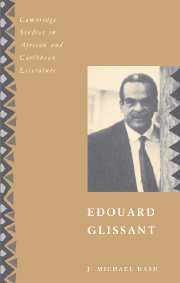Book contents
- Frontmatter
- Contents
- Acknowledgements
- Chronology
- Introduction
- 1 Contexts
- 2 The poetic intention: Un champ d'îles, La terre inquiète, Les Indes, Soleil de la conscience
- 3 Novels of time and space: La Lézarde, Le quatrième siècle
- 4 Writing the ‘real country’: L'intention poétique, Malemort, Boises, Monsieur Toussaint
- 5 Towards a theory of Antillanité: La case du commandeur, Le discours antillais
- 6 A poetics of chaos: Pays rêvé, pays réel, Mahagony, Poétique de la relation
- Notes
- Bibliography
- Index
1 - Contexts
Published online by Cambridge University Press: 29 September 2009
- Frontmatter
- Contents
- Acknowledgements
- Chronology
- Introduction
- 1 Contexts
- 2 The poetic intention: Un champ d'îles, La terre inquiète, Les Indes, Soleil de la conscience
- 3 Novels of time and space: La Lézarde, Le quatrième siècle
- 4 Writing the ‘real country’: L'intention poétique, Malemort, Boises, Monsieur Toussaint
- 5 Towards a theory of Antillanité: La case du commandeur, Le discours antillais
- 6 A poetics of chaos: Pays rêvé, pays réel, Mahagony, Poétique de la relation
- Notes
- Bibliography
- Index
Summary
Dans le monde où je m'achemine.
je me crée interminablement.
Frantz FanonIt is difficult to write unselfconsciously about Edouard Glissant's life, if only for the simple reason that modern literary theories have fiercely questioned the use of biography and the notion of author as a useful way of approaching the literary text. This problem, however, is further complicated in Glissant's case by the fact that he himself is acutely aware of the danger in seeing the individual as sole agent or originating source of the work. As he states in his essay ‘Le roman des Amériqués’:
L'auteur doit être démythifié; oui parce qu'il doit être integré à une décision commune. Le nous devient le lieu du système génératif, et le vrai sujet.
(The author must be demythified, certainly, because he must be integrated into a common resolve. The collective ‘we’ becomes the site of the generative system, and the true subject.)
Given Glissant's awareness of the need to ‘demythify’ the author, it is problematic to resort to a biographical centre, the authorial self, as an ordering principle for explaining the evolution of his literary production.
The acute selfconsciousness and the attendant need to replace the idea of self as origin with the ideal of a collective identity point to both the literary tradition which Glissant criticizes and the nature of the community he inhabits. On one hand, Glissant is reacting against the solipsistic authorial self which is central to early attempts at self-affirmation in Caribbean writing.
- Type
- Chapter
- Information
- Edouard Glissant , pp. 4 - 25Publisher: Cambridge University PressPrint publication year: 1995



